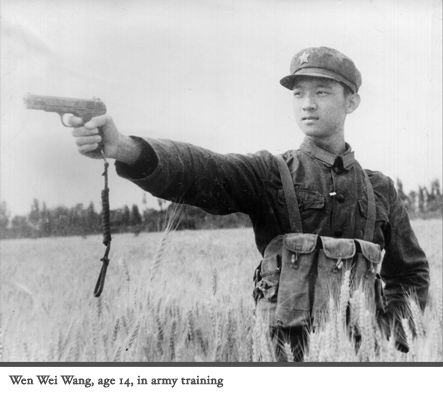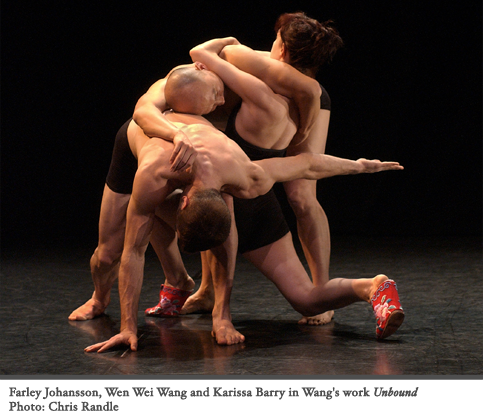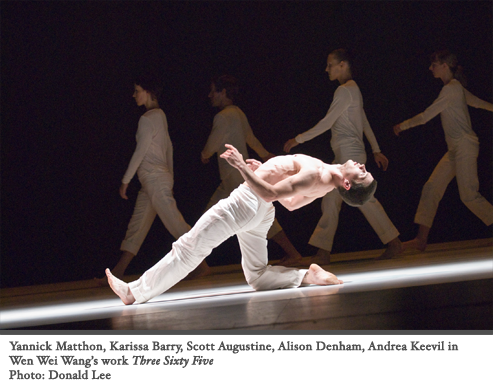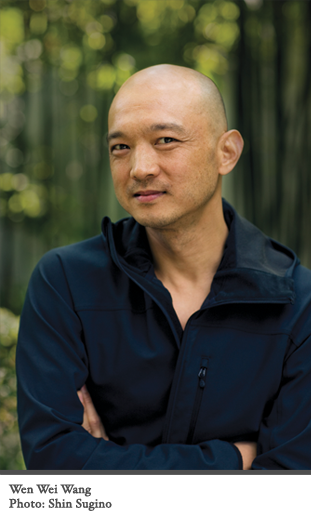| 
Enter Dancing Home l previous page  During the four years before my graduation from the school in 1982, there were no summer breaks and we were not allowed to visit our homes. In the first year, we were thirteen or fourteen years old. We were sent to an army base outside Lanzhou for military training to learn how to shoot guns and be real soldiers. It's like in the United States – if there's a draft, people have to serve their country, and that can be a good thing, I think. I look back on it and can't believe I did all that – it's made me understand many things. At that time, you don't know, you just do it, but now – I think my life has become more interesting. During the four years before my graduation from the school in 1982, there were no summer breaks and we were not allowed to visit our homes. In the first year, we were thirteen or fourteen years old. We were sent to an army base outside Lanzhou for military training to learn how to shoot guns and be real soldiers. It's like in the United States – if there's a draft, people have to serve their country, and that can be a good thing, I think. I look back on it and can't believe I did all that – it's made me understand many things. At that time, you don't know, you just do it, but now – I think my life has become more interesting.
CA: You had a very regimented life as a student, so maybe that helped you adapt to the army training. WWW: Yes. We were at the army base for two months, which changed our approach to thinking, to studying – and we learned how to be focussed, how to get through challenges. When I was growing up, I was the youngest, the baby, with two older sisters. My mother spoiled me and always did everything for me, so I didn't know how to take care of myself. In the army, we had to learn how to look out for ourselves, to learn skills, learn how to survive, to be tough.CA: Really, it is hard to imagine – it is a different world.WWW: Yes, lots of stories! CA: Can you speak about how things shifted for you, when you stopped dancing for others, and started to build your own company? WWW: I stopped working for Ballet BC in 2000 and became a freelance choreographer and dancer. Since then I have created a number of works. Each one has brought me closer along the road to my ideal destination, that being the realization of my dream to be known as a choreographer with a strong personal voice. The Firehall Arts Centre commissioned my work Tao, a full-length piece to the music of Giorgio Magnanensi, a contemporary composer originally from Italy. With Tao I gained the confidence to be myself, to speak from the roots of my being. In 2003, I formed my own company. In 2006 I received the CanDance commission for a major work, Unbound, which premiered at the Canada Dance Festival in Ottawa, followed by a tour of major Canadian cities. CA: All credit to you – it's not so easy to start a company now … CA: All credit to you – it's not so easy to start a company now …
WWW: The competition is very tough now, particularly as I came from another country, not speaking the language well. I think I've been lucky to know Grant and Earl, who have given me a lot of support. The first few years I was on project grants and from year to year didn't know whether the company would have enough money or not. It doesn't matter how successful you are – year to year we all face competition. It's a stress, but it does not stop you if you really approach your work creatively. CA: You have chosen to be in a very different place from where you would have been had you decided to stay in China, where you would have had work security … a cheque every month, a pension …WWW: Yes, artists in the major companies in China are cared for – they are sheltered. Some of the companies have 300 artists, some have over 500. At the time I was still in China, I was a kind of “golden boy”. Our company wanted me to become a Communist Party Member. When I finished my university degree, I would come back as an artistic director. But I just threw everything away … CA: That was a big choice!WWW: Yes. I am happy now. I have my own company and my own work. I don't think that would happen in China. I have had the opportunity to extend my movements, ideas and visions and to have the courage to get out of the box. I had always seen dance as a universal art form, able to communicate through movement to anyone, anywhere, at any time. Dance relates to the human condition without words. Dance is its own language and that is my language.CA: Dance in Vancouver has a particular character – can you speak about your experience of this, and how this has changed, or what has changed, through your work, or through changing circumstances?
WWW: After becoming freelance in 2000, I worked with many of the local choreographers – Lola MacLaughlin, Peter Bingham, Karen Jamieson, Jennifer Mascall and Paras Terezakis, each one with their own voice. Since the Scotiabank Dance Centre was established, the dance community has flourished and stimulated dancers and choreographers. We also have The Dancing on the Edge Festival, International Dance Festival and the Push Festival. The Dance House series brings international contemporary companies to Vancouver. We also have a lot of dance companies including those of Crystal Pite, Noam Gagnon, Alvin Tolentino and Lee Su-Feh. They are doing important work; Crystal Pite's company still tours around the world. There is the new generation coming up now, influenced by urban dance. They are doing incredible work. The Vancouver dance scene is becoming more interesting.I'm here in Toronto on my company's fifth cross-Canada tour. Since 2006, every two years … CA: That's fantastic – not a common touring schedule in these years … WWW: It's true, particularly for companies from Vancouver. In 2010, we went to the Venice Biennale in Italy. That year, they were celebrating Canadian culture. There were six Canadian contemporary dance companies – four from Montreal: Les Grands Ballets Canadiens, Compagnie Marie Chouinard, Daniel Léveillé and José Navas (Compagnie Flak); and two from Vancouver: Crystal Pite and my company. I felt honoured to be one of the six companies and to represent Canada as a Chinese-Canadian artist – it was a pinnacle. Another pinnacle for me was the 2010 Winter Olympics in Vancouver. The Vancouver Opera did a new production, Nixon in China, composed by John Adams. I was invited to choreograph a half-hour ballet based on The Red Detachment of Women produced by Madam Mao in the 1970s. I was very excited because I had already danced this ballet in China. Then that production went to the San Francisco Opera last June. It was very nice to work with the opera. CA: It is amazing what you've accomplished so far, Wen Wei.WWW: Thank you. 
| |


 During the four years before my graduation from the school in 1982, there were no summer breaks and we were not allowed to visit our homes. In the first year, we were thirteen or fourteen years old. We were sent to an army base outside Lanzhou for military training to learn how to shoot guns and be real soldiers. It's like in the United States – if there's a draft, people have to serve their country, and that can be a good thing, I think. I look back on it and can't believe I did all that – it's made me understand many things. At that time, you don't know, you just do it, but now – I think my life has become more interesting.
During the four years before my graduation from the school in 1982, there were no summer breaks and we were not allowed to visit our homes. In the first year, we were thirteen or fourteen years old. We were sent to an army base outside Lanzhou for military training to learn how to shoot guns and be real soldiers. It's like in the United States – if there's a draft, people have to serve their country, and that can be a good thing, I think. I look back on it and can't believe I did all that – it's made me understand many things. At that time, you don't know, you just do it, but now – I think my life has become more interesting. 

